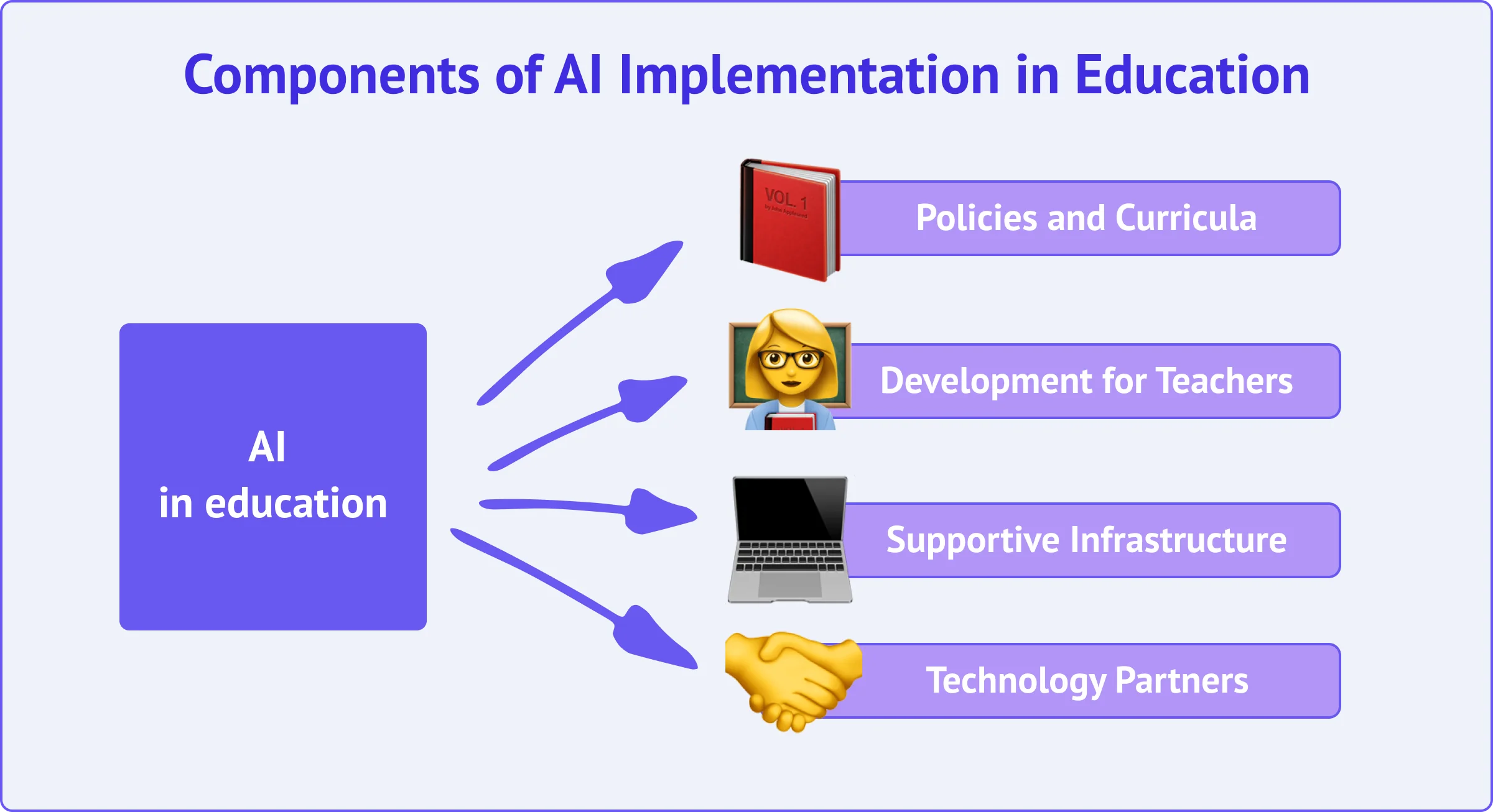Technology has been influencing the professional environment for a while, and it’s no wonder that artificial intelligence is now making its way into education. K–12 schools should no longer avoid it, as wise implementation of AI can shape students into adept, future-ready individuals. As AI cements its role in various industries, integrating it into school curricula promises to enhance learning while they’re still students and secure a competitive edge for them in the job market as young professionals.

✅ AI Essay Writer ✅ AI Detector ✅ Plagchecker ✅ Paraphraser
✅ Summarizer ✅ Citation Generator
Key takeaways:
- Mastering AI tools and technologies is essential for students to succeed in the digital economy.
- AI can vastly improve students’ information processing abilities, preparing them to handle complex problem-solving.
- Educators need ongoing training to effectively integrate AI into teaching.
- Schools must develop inclusive, strategic plans to embrace AI, involving all stakeholders from the district to the classroom.
Artificial intelligence has already dramatically reshaped various industries and our lives in general, and it seems like it’s not going to stop anytime soon. Education, K-12 schools, in particular, are considering how best to harness this powerful technology. According to Wendy Jones and Jennette Vanderpool at edtechmagazine.com, AI’s integration into classrooms is becoming increasingly important for student success in the digital economy. And it’s teachers who should become leaders of this initiative. Highlighting the importance of educators in this tech transition, the Department of Education’s Office of Educational Technology champions the involvement of “Humans-in-the-Loop,” convincing that AI enhances rather than replaces human work. Reflecting on AI’s role, Harvard Business School professor Karim Lakhani underlines the growing necessity for schools to prepare students with AI competencies to remain viable in the future job market:

Enhancing Critical Thinking Skills in K–12 Through AI
Artificial intelligence has great potential to be a powerful educational tool that significantly broadens the learning capabilities of students if used correctly. By providing rapid access to extensive information, AI technologies such as generative models can replicate and improve traditional research methods more efficiently. This shift from passive information consumption to active engagement allows students to analyze and synthesize data better, training advanced critical thinking skills.
Teaching prompt engineering is another important area that should be paid attention to. At the high school level, it equips students with essential techniques to question and verify the information they receive, preparing them to meet the constantly changing demands of the workforce. Schools that proactively integrate AI education position their students as preferred candidates in a job market increasingly dominated by AI expertise. By encouraging a learning environment where AI is a staple of the educational process, these institutions make their students more than ready for employment—they are desired in the modern workforce.
Initiating AI Integration in Schools
As with any new teaching methodology, to effectively integrate AI into their curricula schools need a strategic and inclusive plan. This begins with the formation of an AI task force. Such a group should include various participants: teachers from different disciplines, administrators, technology specialists, parents, and even students. Their goal? To create a comprehensive framework that will guide the deployment of AI technologies in a way that benefits every student and teacher. This may require completing several requirements:

Creating Effective Policies and Curricula
The AI task force’s first responsibility is to inform and shape school board policies concerning AI. This involves developing detailed syllabi that incorporate AI tools responsibly and ethically into the learning process. The market is flooded with options, and not all are suitable for educational purposes. Tools need to be evaluated on their educational value, ease of use, alignment with curricular goals, and compliance with privacy laws and such sensitive issues as cybersecurity and student data privacy. This foundational policy guarantees that AI tools are used to improve educational results while maintaining safety and ethics.
Professional Development for Teachers
Given that teachers are on the frontlines of educational delivery, proper and gradual professional development is absolutely necessary. Teachers need training on using AI tools in the first place, but also on how to integrate them into their teaching in ways that facilitate learning without overwhelming their already significant workload. This professional development should be continuous and aligned with the developing character of AI technology, enabling teachers to stay current and effective in their instructional strategies.
Engaging with Technology Partners
Collaboration with experienced technology partners can significantly smooth the transition to AI-enhanced learning. These partners can offer insights into the best AI solutions and strategies for deployment in educational settings. They can also help schools overcome the challenges of implementing new technologies, from integration with existing IT infrastructure to training staff and students in their use.
Building a Supportive Infrastructure
Finally, schools must consider the infrastructure required to support AI tools. This includes technical infrastructure, like sufficient internet bandwidth and hardware, and human infrastructure, such as IT support staff trained to manage and troubleshoot AI applications. Robust and reliable infrastructure is critical to prevent disruptions and maximize the educational benefits of AI.
Conclusion
AI integration in K-12 education is a required, and in many ways inevitable, progression that will fill the gap between conventional teaching methods and the needs of today’s economy. By integrating AI, schools will improve their teaching frameworks, providing their students with the critical skills required to succeed in AI-augmented circumstances.
Follow us on Reddit for more insights and updates.





Comments (0)
Welcome to A*Help comments!
We’re all about debate and discussion at A*Help.
We value the diverse opinions of users, so you may find points of view that you don’t agree with. And that’s cool. However, there are certain things we’re not OK with: attempts to manipulate our data in any way, for example, or the posting of discriminative, offensive, hateful, or disparaging material.